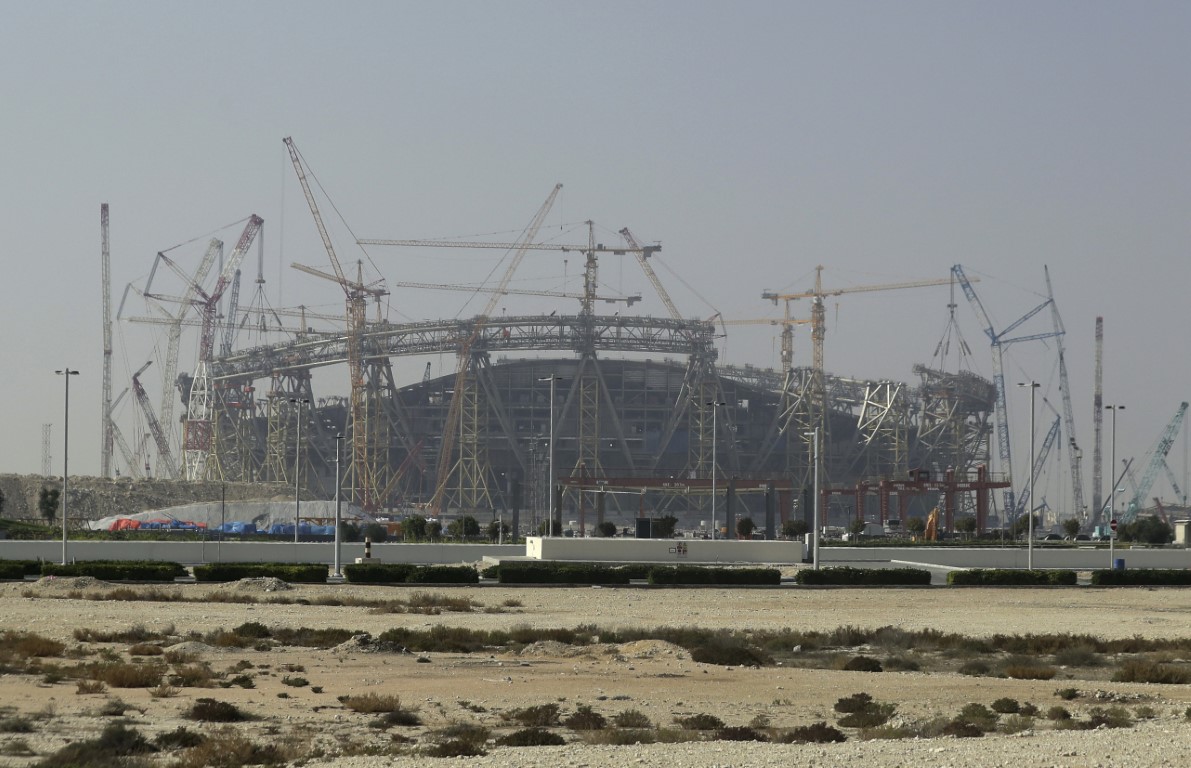Israel is not listed among Middle East countries in a section of the FIFA website providing information about hospitality packages for the upcoming World Cup in Qatar in November-December.
Instead there is only a listing for “Occupied Palestinian Territories.”
The issue was first reported by the Ynet news site on Wednesday.
A section on the website of the world soccer governing body, FIFA, deals with hospitality packages and enables visitors to find their nearest agent to make arrangements.
After choosing “Asia & Middle East” from a map of the world, a dropdown list further narrows the choices.
Get The Times of Israel's Daily Edition by email and never miss our top stories
Israel is not among the dozens of countries listed, though “Occupied Palestinian Territories” is.
Israel is not listed in the section for Europe, either.

In this Dec. 20, 2019 file photo, construction is underway at the Lusail Stadium, one of the 2022 World Cup stadiums, in Lusail, Qatar (AP Photo/Hassan Ammar, File)
Hospitality packages include accommodations, tickets for a game as well as additional benefits such as access to a reception. Prices run from $950 to $6,700, depending on which round of the contest the game is.
Winterhill Hospitality, a Hong Kong-based company, has exclusive rights to offer hospitality services for the World Cup, via FIFA.
On its website it says that its subsidiary MATCH Hospitality “is the only company in the world that is authorized by FIFA to offer and guarantee exclusive ticket-inclusive hospitality packages for every match of the FIFA World Cup Qatar 2022™, directly or through its appointed Sales Agents.”
In June, Israel announced that Israeli citizens had been granted permission to visit Qatar for the World Cup, despite the two nations having no formal diplomatic relations.
A joint announcement from the ministers of foreign affairs, defense and culture and sport at the time said Israeli citizens — who ordinarily can only enter Qatar on a foreign passport — will be able to freely travel and attend games there during the tournament, scheduled to begin on November 21.
Under the terms of the deal reached with FIFA, the sport’s international governing body, Israelis seeking to attend must first purchase a ticket to a game, then apply online for a Fan ID card, approval of which grants its holder entry to Qatar and enables them to order accommodation.
Pressure from sporting tournaments has helped push new diplomatic horizons for Israel in the Gulf. In 2018, two years before agreeing to establish ties with Israel, Abu Dhabi began allowing the Israeli flag to be shown and anthem to be heard during sporting events, ending a longstanding policy it shared with most other Gulf states.
Qatar hosted an Israeli trade office from 1995 to 2000, but is seen as unlikely to join other Gulf states in establishing full ties with Israel due to its own relationship to Iran.
Qatar’s choice as the location for the biggest tournament in soccer, held every four years, has been dogged by controversy. Last year, an Associated Press investigation found that the country hired an ex-CIA officer to spy on FIFA during the bidding to host the tournament.
In 2014, a Sunday Times report claimed a Qatari official gave a total of $5 million to football officials to build support for his country’s bid.
Later the same year, a UK Guardian newspaper report found that Nepalese World Cup construction workers in Qatar were dying at a rate of one every two days.

Construction work under way at the Khalifa Stadium in Doha, Qatar, November 9, 2014. (Rob Harris/AP)
There have also been concerns over the high temperatures that the country endures, with World Cup organizers stressing to media the tournament will be staged in the winter months and played in air-conditioned stadiums.
Qatar has made a series of reforms to its employment regulations since being selected to host the 2022 World Cup, which has required a vast program of construction dependent on foreign workers.
In previous years it was widely reported that Qatari construction firms regularly underpaid foreign workers and confiscated their passports on arrival, forcing them into perpetual slavery.


